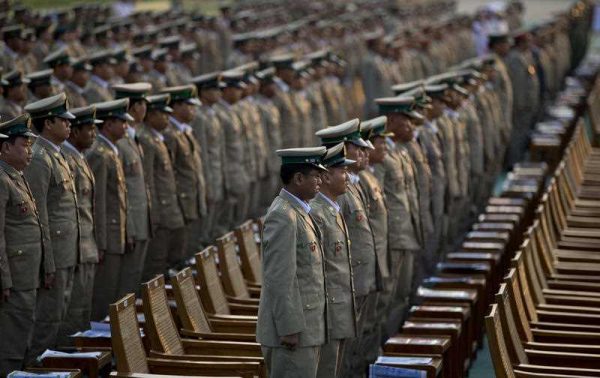While educational programs promoting civil–military relations currently exist, the new legislation authorises expanding relations to include material and technical training with respect to humanitarian assistance and disaster relief.
But engaging with Myanmar is increasingly coming under scrutiny. There are fears that the US is moving too quickly to restore relations. While Myanmar is no longer overtly a military regime, the implementation of democratic reforms appears to be stagnating. The Tatmadaw, the argument continues, must fully withdraw from the political sphere before any opening of relations begins. If the US extends relations at this juncture it could possibly embolden the Tatmadaw to continue their involvement in the administration of the state with no fears of repercussions.
Some are also concerned that regardless of the direction and intensity of the reform process there can be no reversal of relations with Myanmar. The relationship is key to Washington’s 2011 ‘rebalance’ towards the region: a response to altering geopolitical power dynamics, most notably the rise of China. As a result, Myanmar is depicted as the latest arena of Sino-American competition with democratic developments a secondary condition to political and strategic influence in the country.
Despite the legitimacy of these arguments, the military in Myanmar is currently the critical entity in the reform process and must be engaged by the international community. The US must recognise and accept (for the time being) their position within the political architecture. The military remains the most important political actor. It is guaranteed an effective veto over any future changes to the political system with constitutionally mandated representation in parliament and cabinet. The reform process is a top-down one and is unlikely to be influenced anytime soon by bottom-up public pressures. Attempts to pressure the regime via sanctions and/or diplomatic isolation, both already in place, will not force the military to withdraw. Instead, the military must be incentivised, influenced and supported to continue to cede political power.
The military does not need to fully embrace or support reform measures immediately. But it does need to develop a reluctance to interfere in their evolution. Increasing military-to-military relations can facilitate such a change by influencing the culture and outlook of the Tatmadaw, both towards its citizens and the wider international community.
Education regarding civil–military relations and building competencies in humanitarian assistance and disaster relief will assist in massaging the Tatmadaw’s concerns regarding civilian inclusion in politics. Such activities build a narrative of a military that is at the service of the populace and not the other way around. At the very least, the short- to medium-term goal should be military non-interference in the reform process. This is critical to ensure that the Tatmadaw does not use violence to reintroduce itself as a ruling power, as it did in 1988 and 2007.
The Tatmadaw has moved from an outright ruler to a veto player allowing the reform process to operate largely free of its control — but it maintains the ability to reject aspects it deems threatening to its interests. The next evolution is the military relinquishing all formal political powers. But even if/when this occurs they may still intrude into politics in times of ‘crises’ — similar to how Thailand’s military operates. The complete removal of the military will be dependent on the eventual transformation of the organisation itself. And, most importantly, its relationship and responsibilities to the state and wider society.
There have already been significant changes in the nature and scope of Naypyidaw’s relations with former adversaries, including ethnic groups, political parties and the West. The Tatmadaw has not completely viewed these entities as benign agents or equal partners. There is ongoing fighting with some ethnic groups and lingering suspicions of the West’s intention. But the Tatmadaw has begun to develop linkages via formalised political settings, creating space to build supporting dialogue, compromise and cooperation.
The US can assist the Tatmadaw in improving its relationship with the political system. Existing sanctions against the jade and ruby industries, as well as the Specially Designated National and Blocked Persons List against specific individuals, affords Washington political leverage to entice the Tatmadaw to continue reforms.
The withdrawal of the Tatmadaw from politics will not guarantee a comprehensive and everlasting move towards democracy. Other key issues — such as developing strong political and legal institutions, terminating ethnic and religious conflict, and building an inclusive state and a robust economy that benefits both rural and urban areas — do not solely rely on the military exiting politics. But transforming the military from a leading political actor to an institution primarily concerned with national defence will facilitate and support the long-term building of a democratic state. US military relations with the Tatmadaw can play a crucial role in supporting these objectives, which serves the interests of both the states involved and reformers inside Myanmar.
Adam P MacDonald is an independent researcher based in Halifax, Canada.

